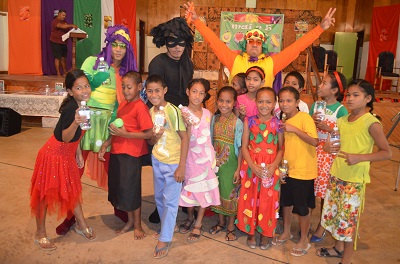Schools across the Pacific have been helping kids develop healthy habits that can last a lifetime. Health Promoting Schools (HPS) programmes focus on different healthy behaviours including healthy diet. Schools across Fiji, Solomon Islands, and Tonga have focused on promoting healthy diet and increasing access to healthy foods.
Health Promoting Schools in the Pacific
Health Promoting Schools (HPS) aim to improve the health and wellbeing of students through a “whole-of-school” approach. Improving health and well-being is expected to contribute towards improved student educational outcomes.
People can develop life-long habits during their formative years. Children spend as much as half their day in school, and some eat the majority of their meals on school campus during the week. As such, schools across the Pacific have been successful entry points for promoting healthy habits, healthy decision making, and protecting student health through HPS Programmes. Each HPS programme is uniquely tailored to the needs and capacities of each island and each school.
Promoting healthy diets for a healthy future
‘The ‘no junk food policy’ at school has reached home and parents have contacted the school with surprise that children are not asking for sweets when parents go to town but have asked for fruits instead.’
- HPS coordinator, Rabulu Primary School, Fiji
In 84 schools across Fiji, children get a healthy and nutritious lunch each day based on new guidelines for canteens and school grounds. In addition to a focus on healthy diet, many school incinerators have been replaced, and organic waste is composted. All children of HPS schools can now participate in physical education thanks to new equipment such as narrow soccer goal nets for students using wheelchairs. These changes are the result of the Fiji HPS programme which covers all nine education districts across the entire country. Educators, school leadership and management, and students have worked with the national HPS focal point from the Ministry of Education to identify priorities and develop action plans using the WHO HPS Framework.
As a result of the HPS programme in Solomon Islands, HPS school markets in four Honiara schools now follow guidelines on providing nutritious food options making healthier choices more accessible to students and staff. These schools in Honiara have worked to involve parents and other community members in their efforts to focus on addressing the worrisome results of the Global School-based Health Survey, which found that 45.1% of students surveyed drank carbonated soft drinks one or more times per day during the past month. Both the Ministries of Education and Health and Medical Services are working together to address the accessibility and resource challenges with expansion of the HPS programme to other areas in Solomon Islands to grow the beneficial impacts of HPS across the nation

Primary school children across Tonga now have increased student access to fruits and vegetables as a result of a HPS programme led by the National Healthy Eating Subcommittee. The Global School-based Health Survey (GSHS) revealed that only 38.7% of students consumed the recommended 5 or more servings of fruits and vegetables on a daily basis, and the School Breakfast Survey found that 54% students were consuming foods high in saturated fat, sugar and salt for breakfast. In response, government ministries and NGOs of the National Healthy Eating subcommittee, private business, parents, and teachers came together to establish the Mai e 5! Programme, which promotes fruit tree and vegetable garden planting in Tonga’s primary schools in addition to promoting awareness among students on the importance of consuming fruits and vegetables.
